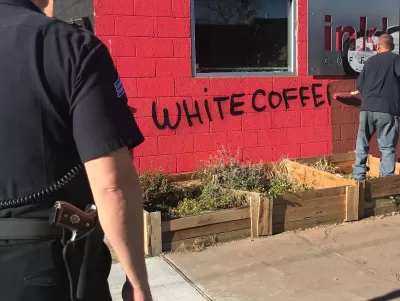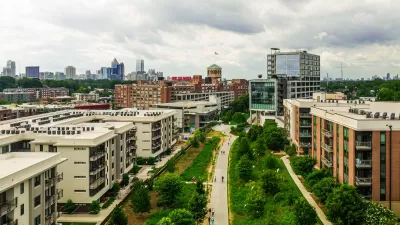Despite decades of our raising the issue of displacement in the face of rising rents, many Americans still do not see this as a call-to-action or a failure of public policy. Here is why our housing messaging may be backfiring.

Several weeks ago, social media ignited in outrage over a sign posted outside a small café in Denver. On one side, the sign read, “Happily Gentrifying the Neighborhood Since 2014”. On the other side it read: “Nothing says gentrification like being able to order a cortado.” The backlash from community advocates was swift.
The owners of this cafe probably did not intend to create the firestorm they started—they just wanted to sell more lattés—but their gentrification joke-misfire raises a larger, more troubling point: The economic plight of low-income Americans is worsening, and we do not have the public support we need to scale policies that would improve their well-being nor to improve the racially/ethnically segregated neighborhoods in which they live, without displacing them.
Generally, many Americans feel personally empathetic toward those who are struggling, yet our public policies reek of a growing antipathy toward the poor that is difficult to dislodge.
Many of the same people, who in our polls say that they are in favor of better housing solutions for residents, fail to support affordable housing developments when they are proposed in nearby neighborhoods, fail to support legislation that would make it possible to build, create, or preserve existing affordable housing, and fail to support the organizations trying to help low-income people in their communities.
Millions of people are being displaced from their homes because their incomes are not keeping pace with rising housing costs, yet there seems to be very little sustained appetite to address or correct this issue. When we try to raise awareness and offer potential solutions, we often find ourselves largely in conversation with ourselves.
The Denver café reminds us, quite painfully, that despite decades of raising the issue of displacement in the face of rising rents, many people still do not see this as a call-to-action or a failure of public policy. A cursory glance at the comments section of the New York Times article that covered the Denver story shows how ambivalent most people are about this issue.
A report titled You Don’t Have to Live Here examines why housing messaging is backfiring, and makes some concrete recommendations based on empirical evidence about how to change course.
FULL STORY: Who Gets to Live Where, and Why? The Answer May Lie in Our Messaging

Planetizen Federal Action Tracker
A weekly monitor of how Trump’s orders and actions are impacting planners and planning in America.

Canada vs. Kamala: Whose Liberal Housing Platform Comes Out on Top?
As Canada votes for a new Prime Minister, what can America learn from the leading liberal candidate of its neighbor to the north?

The Five Most-Changed American Cities
A ranking of population change, home values, and jobs highlights the nation’s most dynamic and most stagnant regions.

‘Quality Work, Fast’: NC Gears up for Homebuilding After Helene, Trying to Avoid Past Pitfalls
The state will field bids to demolish, repair and rebuild homes in the mountains. After struggles in eastern NC, officials aim to chart a different course.

Washington State’s Parking Reform Law Could Unlock ‘Countless’ Acres for New Housing
A law that limits how much parking cities can require for residential amd commercial developments could lead to a construction boom.

Wildlife Rebounds After the Eaton Fire
Following the devastation of the Eaton Fire, the return of wildlife and the regrowth of native plants are offering powerful signs of resilience and renewal.
Urban Design for Planners 1: Software Tools
This six-course series explores essential urban design concepts using open source software and equips planners with the tools they need to participate fully in the urban design process.
Planning for Universal Design
Learn the tools for implementing Universal Design in planning regulations.
Central Transportation Planning Staff/Boston Region MPO
Heyer Gruel & Associates PA
Institute for Housing and Urban Development Studies (IHS)
City of Grandview
Harvard GSD Executive Education
Regional Transportation Commission of Southern Nevada
Toledo-Lucas County Plan Commissions





























